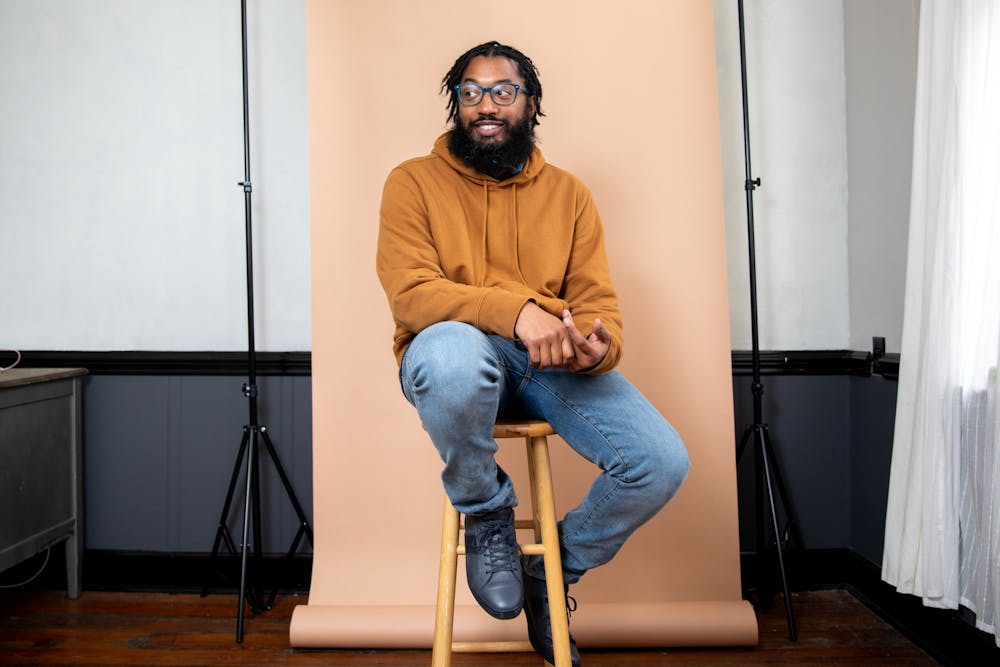Leading up to the initial cancellation of the exhibit, Watson said that there were ongoing points of tension during his artist residency with the Stone Center, specifically about which images would be included in the photo story and the content depicted.
After the initial cancellation, Watson said he had no communication with Jordan until learning of the March 4 exhibition. Thursday morning, following the email, Jordan left a voicemail asking Watson to return his call. Watson said he did not.
“The first thing I’m thinking is this is really malicious, this is really disrespectful and I have no reason to believe otherwise,” Watson said. “Who plans and schedules an exhibition without the artist? No one, ever.”
He originally began his artist residency with the center after it saw his photo story “Behind the Mask'' was featured in The Post. UNC reached out to him, he said, noting the “evocative” nature of the photo story and asked if he would create an exhibit like this on campus.
Later, specific images — one depicting Vice Chancellor for Public Affairs and Secretary of the University Clayton Somers, another of Black students leading demonstrations during a Board of Trustees meeting about journalist Nikole Hannah-Jones’ tenure status and a third of the Unsung Founders Memorial — were rejected by the Stone Center.
Watson said the situation was censorship.
The Stone Center referred to the situation as "disagreements over content and scope" in a Feb. 24 statement.
“And (Watson’s) notion of censorship, as he says, that we don’t want to make white people uncomfortable — give me a break,” Jordan said in a press conference. “And, you know, we don’t do exhibitions just to make people uncomfortable. People get uncomfortable on their own terms. We don’t, we don’t have to traffic in that.”
University response
After learning of the reinstatement of the "Tarred Healing" exhibit set to open March 4, Watson contacted Chancellor Kevin Guskiewicz directly in an email on Thursday, March 3.
In the email, Watson said that he did not authorize the Stone Center to use his images in an exhibition and requested to continue further communications with a University representative other than Jordan.
Watson later found out that the exhibition had been canceled for the final time and received a call from Provost Chris Clemens on March 4.
To get the day's news and headlines in your inbox each morning, sign up for our email newsletters.
“In that call, I congratulated Mr. Watson for producing what I described as an important, moving and challenging work,” Clemens said at a March 11 Faculty Council meeting. “... I told him his work challenges us to confront elements of our past that are difficult to grapple with and that I wanted our students to be able to see them, even the ones that disturb us and make us uneasy.”
In addition to the immediate situation involving the March 4 exhibition at the Stone Center, Clemens and Watson also discussed the situation at large.
“I also apologized to him that UNC had not given him a contract that clearly established who had final artistic control over the exhibition of his prints at the Stone Center,” Clemens said in the Faculty Council meeting. “This was our fault. We needed to own it, and I committed to him to do better in the future.”
During their phone call, Watson requested that his prints be returned to him. Clemens said he drove to the Stone Center and retrieved the prints, which were kept in his office until Watson could pick them up.
At the Monday Faculty Executive Committee meeting, some faculty members expressed concern regarding Clemens' comments on the photo story. They said that Clemens' comments were hurtful and made the Stone Center staff "look incompetent."
Community perspective
Braxton Foushee, a Chapel Hill community member and Civil Rights Movement activist, said that the University is not proud of its past. UNC historically does not want to hear what Black and brown voices have to say, he said.
“They would love to just coat it over,” Foushee said. “But that’s something that really can’t happen. And then the past actions and present actions of some of the leaders of the University and it's a sad commentary when you can’t face your own medicine.”
Foushee has been involved with the University for the last fifty years, he said, and they take the same road every time to get things done.
“They don’t want to understand the feelings of students, of Black students and community folk about what the University stands for,” he said. “They try to push it down with every opportunity they have. They need to live in our shoes and maybe they could see, a little, what’s happening. Because, you see, we live it everyday.”
Watson said he is also concerned about the experiences of students on campus and the implications of what happened beyond its effect on "Tarred Healing".
“I’m thinking about if this happened to me,” Watson said. “If this is my experience as an outsider, as a grown adult with a pretty accomplished resume, what happens to students who have like zero power, zero community, zero media power? What happens to students?”
UPDATE 03/24/2022: The story text has been updated to remove the name of a University official who did not directly give comment to The Daily Tar Heel.
@neptunejade
university@dailytarheel.com | elevate@dailytarheel.com




